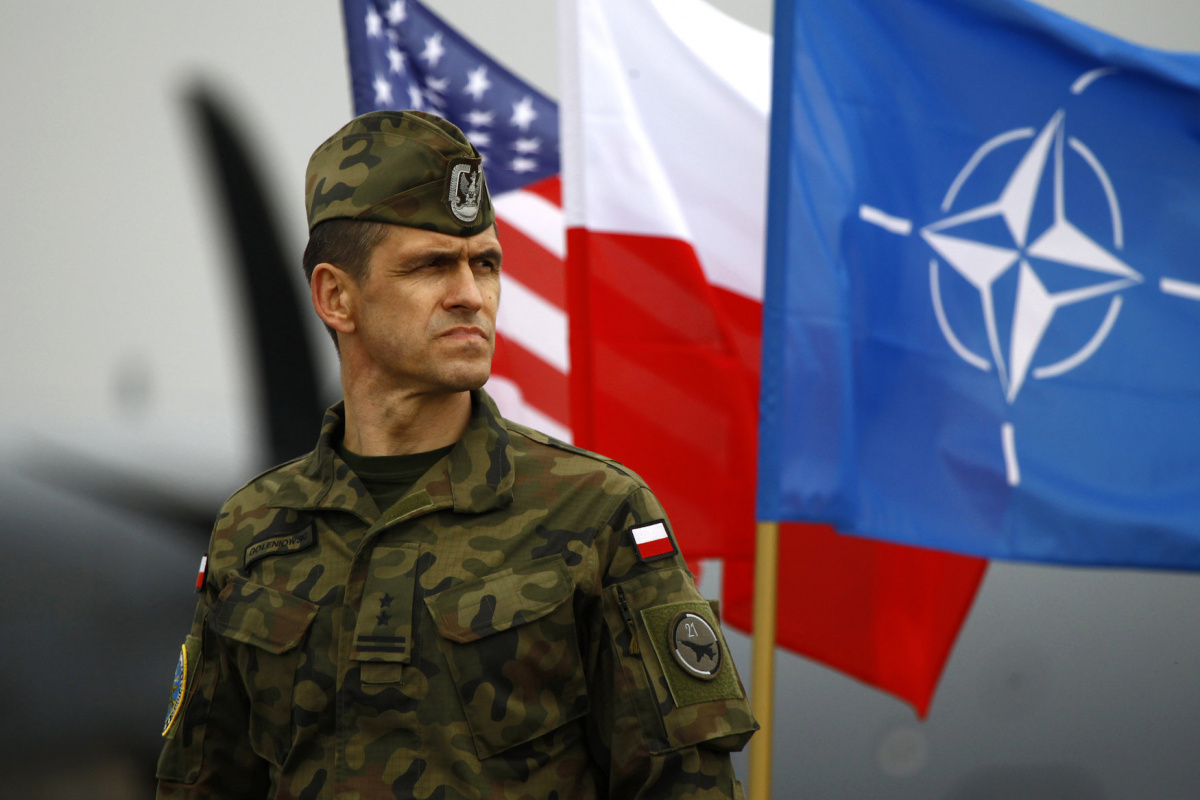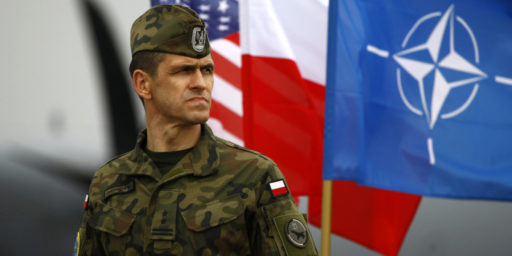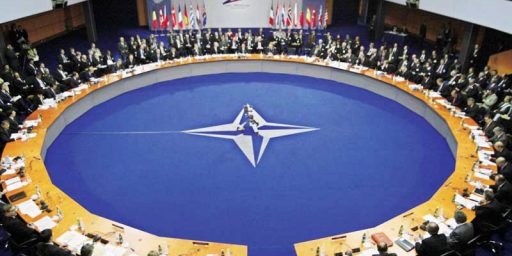The Case Against A Permanent U.S./NATO Base In Poland
The arguments in favor of a permanent U.S./NATO base in Poland are not very convincing.

Lt. General Ben Hodges, who retired last year as the Commander of U.S. Forces in Europe, argues against the idea of putting a U.S./NATO base in Poland:
Establishing a permanent U.S. military presence in Poland, as has been reportedly requested by the Polish government, is exactly one of those cases. Such a move should only be taken if consensus can be achieved among all our allies that it would enhance deterrence and improve the overall security situation for NATO.
That is unlikely to happen — and with good reason.
To begin with, many of our allies would see the establishment of a U.S. military base in Poland — or anywhere else in Central or Eastern Europe — as unnecessarily provocative. It would give Moscow an easy opportunity to claim that NATO is an aggressor and to somehow respond to protect Russian sovereignty.
Unlike the current program of rotational forces, which cycle in and out over limited periods and then return to their home base in the U.S., a permanent base would require U.S. installations, families, schools, shops and all the other infrastructure that comes with it. Some would see this as a violation of the 1997 NATO-Russia Founding Act, the road map for security cooperation between the two entities. Moscow certainly would.
I absolutely don’t believe it is a violation. The Russians blew that out of the water when they invaded Ukraine and changed the security environment envisioned at the time when the act was signed. But I don’t think it is wise to move ahead with a policy that would feed Russian fears, real or not. The move could also create additional friction with allies who are already at odds with each other over Washington’s withdrawal from the Iran nuclear deal and just-announced tariffs on steel and aluminium.
Second, a base in Eastern Europe is unnecessary. The current exercise and deployment program and other important measures — including the placement of equipment needed for armored brigades in pre-positioned stocks — are part of a robust effort to ensure an adequate deterrent against a possible Russian attack. NATO’s adaptation initiative, which is designed to provide the alliance with more flexible response capabilities, is expected to be adopted at the July NATO summit in Brussels and will further improve this effort.
The deployment of enhanced forward presence battlegroups into Estonia, Latvia, Lithuania, and Poland in early 2017, just months after the NATO summit in Warsaw, demonstrated real commitment to deterrence. The speed with which they were deployed showed NATO’s decisiveness, and their multinational makeup — including contributions from Italy, Spain and Croatia — reflect the alliance-wide commitment.
Particularly noteworthy was the decision by Germany to take responsibility as the framework nation for the battlegroup deployed to Lithuania. It was the first to do so and the first to deploy. This was a strong signal to Russia, as well as to other NATO allies. The return of Canada to the European continent, as a framework nation for the battlegroup in Latvia, was another strong strategic message of commitment.
Third, from a practical standpoint, permanently placing an armored brigade combat team in Eastern Europe is simply unfeasible. It would require an expansion of the U.S. Army that does not appear likely to happen. Otherwise the Army would have to move one of the existing combat teams from their current home in Texas, Kansas or Colorado — a change that would encounter strong congressional resistance from those states’ delegations. And due to decisions made six years ago, there are no longer any armored brigade combat teams already based in Germany that could be repositioned further east.
Finally, the Army and therefore U.S. European Command, benefits from the increased readiness that comes from the use of rotational combat teams. A rotational team deploys from its home station via rail to Beaumont, Texas, travels by ship to a European port and then overlands again by rail or convoy to assembly areas in western Poland.
Hodges goes on to argue that there are ways to achieve the deterrent effect that Poland seems to believe a permanent presence would create that fall short of that step but would maintain the unity of the alliance and not overly inflame the relationship with Russia:
The use of rotational forces should be expanded to include all of the eastern flank nations — from Estonia down to Bulgaria as well as in Ukraine and Georgia. What’s really needed in these countries are logisticians, air and missile defenders, and military police, as well as intelligence and communications experts.
Most of these are found in the Army Reserve and the Army National Guard. I would recommend increasing the logistics and transportation capabilities in Eastern Europe in order to increase speed of movement of responding or reinforcing NATO forces. Furthermore, I’d recommend putting air defense units into these countries to protect the critical infrastructure necessary for mission command and the deployment of reinforcements.
General Hodges’s comments come just a week after Poland offered $2 billion toward the cost of constructing and maintaining a permanent American/NATO base on Polish soil, something that would represent the first eastward expansion of a permanent military presence since the collapse of the Warsaw Pact and the Soviet Union. From the Polish point of view, of course, this offer is warranted both because of Poland’s long-standing desire for a closer security and military relationship with the United States and the NATO alliance, which has been generally reluctant to move permanent forces into areas closer to the Russian frontier notwithstanding the fact that the alliance had moved forward with expansion into the former Warsaw Pact and, of course the inclusion of the former Soviet Republics of Latvia, Lithuania, and Estonia into the alliance. Of course, these moves did not come without objection from Russia at the time they were made, and some analysts have suggested that those moves have contributed to the revival of old Russian fears about being encircled by rivals that have been used by Russian nationalists in the past to argue in favor of a more aggressive foreign policy. In fact, and not surprisingly, Russia was objecting to the idea within hours after the news of the offer had been made public.
To be sure, establishing a permanent military presence in Poland would send a signal to Russian President Putin at a time when he has become more aggressive on the ground in Eastern Europe. The most prominent example of that, of course, was the seizre of the Crimean Peninsula in 2014 and the subsequent effort to provide logistical and other support to rebels in eastern Ukraine. At the same time, Russia has been making what could be considered threatening moves aimed at the Baltic State NATO members. In response to those threats, NATO has taken some action designed to push back on Russian assertiveness.
Mere months after the Russians seized Crimea, for example, NATO announced a plan to step up military patrols in Eastern Europe, although that fell far short of establishing a permanent military presence close to the Russian border. This came at roughly the same time that a NATO Commander warned that continued Russian threats could result in the establishment of a permanent NATO presence in Eastern Europe, something the alliance has refrained from doing since completing its eastward expansion with the addition of Bulgaria, Estonia, Latvia, Lithuania, Romania, Slovakia, and Slovenia in 2004, Albania and Croatia in 2009, and Montenegro in 2017. One year later, the alliance announced that it was considering prepositioning equipment and supplies in Eastern Europe such that any future deployment could be easily supplied. In addition to all this, NATO has taken steps such as bolstering air defenses in the areas close to Russia, which the Russians have claimed crosses a “red line” of some sort. Additionally, the alliance has stepped up its training exercises in the east and the United States has expanded its military spending allocated toward Eastern and Central Europe. Taking all this into account, the idea of a permanent base in Poland, and one they’re willing to help pay for, certainly seems like the next logical step, and would most especially be a thumb in the eye of Vladimir Putin.
As I noted in my first post on this matter, the idea of basing the decision to place a base in Poland that is based primarily on that motivation is a foolish and mistaken one:
There may be valid military reasons to accept this offer, but if the idea is to antagonize Russia, that seems to me to be a rather dubious reason to expand the security commitment that NATO and the United States have already made to its Eastern European members. As things stand, NATO appears to already have its hands full dealing with the increased threats that Putin has made in Eastern Europe to longer standing member such as the Baltic states. Giving Russian President Vladimir Putin further reason to keep that pressure up doesn’t seem to me to serve a legitimate purpose at this point in time. Even more dangerous are the proposals to add nations such as Georgia and Ukraine to the alliance. In both cases, we’re dealing with nations that both sit right on the Russian border and have historic ties to Russia that should not be ignored. In Ukraine’s case especially, adding that nation to NATO at the same time that pro-Russian guerrillas continue to fight in the eastern part of the country would make extending membership at this time extremely unwise and likely only to push the alliance and the United States into a confrontation with Moscow that would not be in anyone’s interest. The eastward push of NATO has been widely questioned elsewhere in no small part because it arguably revives very old Russian fears about being encircled by enemies and potential adversaries. Adding to that by accepting this offer from Warsaw is arguably a step too far.
General Hodges makes a compelling case for the argument for the idea that there is no valid military reason for establishing a base in Poling that go above and beyond the objections against the idea of deliberately trying to antagonize Russia. For one thing there simply isn’t a need for such a base given the fact that there are other, less expensive and less logistically challenging, steps that the alliance could take to more firmly secure the place of the eastern alliance members and send a signal to Russia regarding the commitment of the United States and the rest of the alliance. Instead of taking the step of establishing new bases in the east, we should be considering the steps he suggests while at the same time making it clear to Russia that our commitment to the defense of the Eastern European members of NATO is as strong as the commitment to defend Western Europe during the Cold War was. That would accomplish the goals that a base would try to accomplish, but do so at a far smaller cost.






The rationalé for building a base is to spend more money.
To be fair, nobody in the U.S. or NATO seems to be talking about this.
This is entirely a Polish idea.
I think Poland is looking for a clear signal that the U. S. will honor our commitments to NATO and our commitments to Poland through NATO. They may feel that the commitment of the U. S. is open to question. I can’t imagine how, with Trump in office, they might feel they need to probe this.
Yes, but with Trump in the White House that is the rub, isn’t it?
It’s obvious that Poland wants a US base on its soil in order to make it, practically speaking, impossible for the US to not commit its forces in case of a Russian attack.
Pre-Trump, such an extra guarantee wasn’t necessary.
I can’t say that I blame the Poles for feeling which way the wind blows.
If Poland really wanted a US base in its territory, it would invite Benito the Cheeto to attend National Donald Trump day in November 8th, and throw a military parade in his honor.
Poland and the baltic states believe that NATO’s security guarantees require some skin in the game by NATO which really means the US. A permanent base is ideal for that purpose.
While I can definitely understand their situation, I don’t think it’s in our interest and just simply because it would piss Russia off.
NATO(And US allies in Pacific) already has too much military and strategic advantage over Russia. That’s not good.
Look at the map, and look at history. Poland is almost as flat as Holland. Show me a single, serious physical impediment to Russian troops rolling from the border of their stooge, Belarus, the 100 miles to Warsaw. Show me how you’d stop Russian forces in Kaliningrad from closing down Gdansk. Show me how whatever air forces we position in Poland aren’t wiped out in the first 24 hours.
Poland is NATO’s moat. It’s a big, 500 mile expanse that the Russians would have to cross in order to reach Germany. That’s 500 miles for NATO planes to bomb armored columns. It’s 500 extra miles Russian planes have to fly to engage forces from Germany. Why in God’s name would we want to position scarce forces in a useless and impossible to defend place? We would be handing the Russians an early victory and taking a big loss ourselves.
A war with Russia in Europe would of necessity be a defensive war for us. Distance works for the team playing defense. Why would we want to surrender that distance? To reassure Poland that we aren’t Britain and France in 1939? The best thing Poland can do on that front is to reverse their trend toward anti-semitic autocracy, because it’s going to be a whole lot harder to motivate Americans to save some bunch of fascists.
This isn’t just politically stupid, it’s militarily stupid.
Who is going to keep Germany out?
@Doug Mataconis: Somewhere, a defense industry lobbyist or twenty, and/or a state department employee hoping to cash in with that industry, are involved in this idea. War is a business and a base is a commodity.